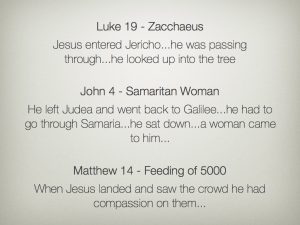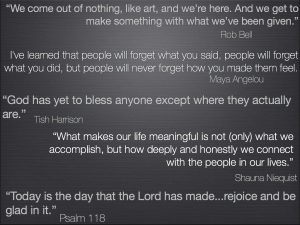by Jonathan Manafo | Feb 20, 2018 | Sunday Conversations
We reach a part of the Beatitudes where things shift. We go from posture to action, from acknowledging where we are, to determining who we will be and how we respond to the new kingdom values that are making themselves at home in our heart.
Here’s where we’ve been so far in this series…
The 1st line? Blessed are the poor in Spirit (recap)
The 2nd line? Blessed are those who grieve (recap)
The 3rd line? Blessed are the meek (recap)
The 4th line? Blessed are those who hunger & thirst… (recap)
In Jesus’ 5th simple line, he uses Mercy to help turn the page from who we are to what we do…
“Blessed are the merciful, for they will be shown mercy.” (NIV)
“You’re blessed when you care. At the moment of being ‘care-full,’ you find yourselves cared for.” (MSG)
Again, we ask this important question: What are you trying to tell us Jesus? What are you trying to say?
This is the only Beatitude where the word in the first part is repeated in the second part:
Mercy (or Merciful) x2.
Any time in scripture when a word is repeated, we have to pause and wonder – what’s going on here?
What does Mercy mean?
- Dietrich Bonhoeffer said that Mercy is irresistible love for the downtrodden, sick, wretched, wronged, outcast, struggling, etc.
- We may be distressed & needy, but we take upon ourselves others distress, concerns, humiliation. We SHOW mercy.
- (common definition) Compassion & Forgiveness shown towards someone whom it is within one’s power to punish or harm or judge. (Like a police officer not giving you a ticket you deserve)
What does it mean to be Merciful or show Mercy?
- In order to show mercy we cannot be afraid of other people’s shame.
- Some would say that being merciful is acting like God does, as the Hebrew word for mercy (chesedh) refers to the ability to identify the suffering of others, going through suffering with others, and entering someone’s difficulty…this word refers to God’s unique quality (in comparison to other ‘g’ gods in the Old Testament.
- This is what God did/does for us through Jesus…
- Being merciful also involves humility and meekness.
- Humble people show mercy.
- Meekness acknowledges our sin to others, and not just their sin to themselves.
I guess the question then is, to whom are we merciful towards?
(1) to me…
The first person I have to show mercy to is me.
Why? Because many of us get stuck right at this point – I HAVE FAILED. I AM NOT PERFECT.
Some of us really struggle with this, things like low self esteem. Our first thoughts when we wake up are: I’m horrible, I can’t do this, I don’t deserve this, if people could really see how bad, dumb, idiotic, sinful I am.
Now, to some degree this is true. You’re not perfect. I’m not perfect. You’ve failed. I’ve failed. But staying there doesn’t help anybody.
Mercy is moving on from the first Beatitude (acknowledging our spiritual poverty) to accepting forgiveness (Mercy) from God.
God Doesn’t See Us This Way!!!
(2) …to others…
The other person I have to show mercy to is others.
- show mercy to others who are suffering/struggling
- show mercy to others who are trapped in sin
The Suffering…
When we show mercy to those who are struggling or suffering, what we’re doing is simply recognizing that we too could easily be in their situation.
It is so easy to forget what struggle is when things are going well.
The Sinful…
If you think people get stuck on their own failures, boy do they ever dwell on how others have failed them.
Instead of waking up in the morning thinking that you’re horrible, maybe you wake up thinking others are horrible. You just can’t get past it. Sometimes it makes us feel better to think about how others are ‘worse than us’. Weird!!! But very human.
That is a BAD place to live. We’re so stubborn because we actually can’t see ourselves in their shoes, and don’t see that we are capable of the same foolishness. The only difference is we’ve experienced grace.
“…see them as true victims, as slaves of sin and the way of the world. Come to see them, not as people to dislike but as people to be pitied. Come to see them as being governed by the god of this world, as being still where we once were, and would be yet for the grace of God…with that in mind we can be and must be merciful with respect to them…”
(Dr. Martyn Lloyd-Jones)
The problem with getting stuck here is that the inability to show Mercy/Forgiveness really does become a prison that we ourselves get trapped in.
“To forgive is to set a prisoner free and discover that the prisoner was you” (L. Smedes)
We often draw lines between people that are ‘worse’ than us, and all that ends up doing is confining us to the boxes we ourselves have put there.
It’s easy to say, he’s this and she’s a that, she’s a CEO, they’re a prostitute, he’s a politician, she’s rich, he’s poor, she’s bad, he’s worse. Those are all lines that divide. Mercy says loud and clear, I identify with your pain, your problem, your poverty, your position, your sin. I will sit there with you, and will walk with you through it.
Two stories come to mind from the gospels. The unforgiving debtor & the prodigal son.
Matthew 18:21-35…a man receives mercy for a debt he owes, then turns around and DOESN’T offer mercy to someone that owes him money….
Luke 15…a son takes his inheritance early, spends it all, nearly dies, gathers enough courage to come back, his father forgives him, receives him, and throws a party for him, only for the older brother to complain that it’s not fair.
That’s point folks. Mercy isn’t about being fair, it’s about showing love. Mercy isn’t about getting revenge, it’s about showering with grace. Mercy doesn’t pick a winner, it actually embraces the loser.
We can all say that it’s not fair, until we’re on the receiving end of mercy, then…then of course we say it’s kind, and loving, and forgiving. And we’re grateful.
Micah 6:8 was a foreshadow of this beatitude. It’s a favourite verse of many people who read the scriptures.
He has shown you, O mortal, what is good.
And what does the Lord require of you?
To act justly and to love mercy
and to walk humbly with your God.
Mercy is a dance that goes back and forth. We receive and we give – we welcome it in and we extend it.
Mercy is forgiveness and humility wrapped up together.
For the follower of Jesus, being merciful is possible, only possible, because we’ve experienced mercy and forgiveness from God. We receive it and we give it.
Instead of forgiving and forgetting. Why not forgive and remember…all that God has done for you.
Take some time today to complete this sentence: I need to show mercy to _____________________.
– – – – – – – – –
Community group questions:
When was the last time you received some kind of mercy or forgiveness? How did it feel?
When was the last time you let someone off the hook for something? How did that feel?
Do you think that showing mercy to ourselves, forgiving ourselves, or at least embracing God’s forgiveness, is part of what Jesus might be saying?
What is easier, being merciful in someone’s difficulty, or showing mercy to someone who’s wronged you or sinned against you? How is the first action connected to compassion? How is the second action connected to our spiritual growth and maturity?
Showing mercy to someone trapped in sin is fleshed out in two ways. 1) For those who have sinned against you and 2) for those who are evidently sinning and messing up and saying all the wrong things to the wrong people. How can we and why should we show mercy in both those cases?
Let’s finish up by looking at Micah 6:8. Read it this way… “What does God want from me?” “He wants Justice, Mercy, and Humility.” How does that sound? About right? Too easy? Too hard? Plain & Simple?
Before someone in your group closes in prayer, take a few seconds and ask God to help you show mercy to someone who you have a hard time showing mercy to.
by Jonathan Manafo | Feb 14, 2018 | Sunday Conversations
 How many foodies reading this post?
How many foodies reading this post?
Notice how foodies seem to want to out do each other on their food-i-ness? “I’m more of a foodie than you are”
Or when we try and out do someone in our passion for a certain food. “I like this more than you do” We might not say it, but we think it ;). I lived this with my twin brother. He’d always try and convince us he liked something more that we did so he could eat more of it.
When I was a kid, if there was something I didn’t like on my dish, and my grandfather got wind of me communicating that, he’d go into a line we heard him say many times. “If you’re hungry, you’ll eat what is in front of you”.
Now…nothing is wrong with having a favourite kind of food…and this is coming from someone who passionately speaks of foods that I love. BUT…once in a while we are struck with the reality that our basic need is simple food & plain water.
When we go without it, we understand the words Hungry and Thirsty so much better.
This leads us to the fourth simple, yet profound line, of Jesus’ Beatitudes. And this one is just as reversed in nature as the first three lines.
We’ve been saying that the Beatitudes reflect a reverse way of moving forward as well as anything else Jesus said.
How much more reversed can you get…Happy are…Blessed are…the poor? The grieving? The meek? The hungry?
The 1st line? Blessed are the poor in Spirit (recap)
The 2nd line? Blessed are those who grieve (recap)
The 3rd line? Blessed are the meek (recap)
Imagine you are part of this poor, grieving, humble and hungry crowd in Matthew 5…and Jesus finally moves to this line?
“Blessed are those who hunger & thirst for righteousness,
for they will be filled.”
Out of all the things Jesus’ has said to this point, this has got to be the most ridiculous. How can this be Jesus? What are you trying to tell those listeners that day…and me today?
There are 4 key words to this text…
- Hungry
- Thirsty
- Righteousness
- Filled
Hunger & Thirst…
The first two words are pretty plain & simple. Hungry & Thirsty is the normal response to lacking something that is essential to living.
Hunger & Thirst are a result of two things:
- elapsed time & used up energy.
- We get hungry after not eating for a while and we get thirsty after using up energy.
Many of us in this part of the world don’t understand hunger. I should say, when you have enough, you really don’t get it.
But we must know that Jesus cares for those who are hungry and thirsty. He said as much in Matthew 25…
‘Enter, you who are blessed by my Father…And here’s why:
I was hungry and you fed me,
I was thirsty and you gave me a drink,
I was homeless and you gave me a room,
I was shivering and you gave me clothes,
I was sick and you stopped to visit,
I was in prison and you came to me.’
“Then those ‘sheep’ are going to say, ‘Master, what are you talking about? When did we ever see you hungry and feed you, thirsty and give you a drink? And when did we ever see you sick or in prison and come to you?’ Then the King will say, ‘I’m telling the solemn truth: Whenever you did one of these things to someone overlooked or ignored, that was me—you did it to me.’
Simply put. The hungry and the thirsty are blessed, as are those who feed them. Bono, the lead singer from U2, got it right when he said, “Don’t ask God to bless what you’re doing, find out what he’s blessing and be there…go there.”
Now…as true and important as that is, it’s not the end of the sentence is it?
Jesus says blessed are those who hunger & thirst for ___________.
…For Righteousness
Righteousness = right relatedness…not with the bible, but with God…and with others.
This isn’t a righteousness you can buy (or sell like the Roman Catholic’s did in the 14th century), trade or work for, but one, as Bonhoefer said, is like a beautiful coat, that is put over us and our sin.
Paul says this about righteousness, “I may gain Christ and be found in him, not having a righteousness of my own that comes from the law, but that which is through faith in] Christ—the righteousness that comes from God on the basis of faith.” (Phil 3:9)
So what is Jesus saying about this righteousness, this God-relatedness? You need to hunger and thirst for it in the same way you hunger and thirst for food.
Knowing God and the ways of his kingdom is so important that you gotta desire it…ache for it…long for it…for Him.
This begs the questions: What is it that you long for? That you hunger for? That you thirst for? That you ache for? This question tells us a lot about who we are; it tells us what consumes our minds & hearts
Jesus words are reminiscent of Isaiah 55:1-2,
“Come, all you who are thirsty,
come to the waters…
Why spend money on what is not bread,
and your labor on what does not satisfy?
Listen, listen to me, and eat what is good,
and you will delight in the richest of fare.”
Remember…Jesus described himself as the bread of life…as living water…to eat & drink.
Let’s jump to Jesus’ words in Matthew 6:33 (on the hillside) where Jesus says, “Seek first God’s kingdom and his righteousness…and all these things (food, drink, covering) will be given to you as well”
What is Jesus saying?
Long for, ache for, starve for, be hungry for…righteousness…Be Hungry for…GOD…Be Thirsty for…God!
…they will be filled…
What is the promise for this beatitude?
Of course it’s going to be ‘and they will be filled’.
This is God’s promise to those who are physically hungry & spiritually hungry. YOU WILL BE FILLED.
What fills you? What satisfies you? What quenches you? What makes you feel settled?
Nothing is wrong if you say food & drink. But what Jesus is getting at is so much more.
Two Psalms help us out here:
Psalm 42,
As the deer longs for streams of water,
so I long for you, O God.
I thirst for God, the living God.
Psalm 36,
Taste and see that the Lord is good;
blessed is the one who takes refuge in him.
Augustine wrote his own Psalm with these words, “You have made us for yourself, Lord, and our hearts are restless until they rest in you.”
Ronald Rolheiser says something similar, “Spirituality is what we do with our unrest, with our hunger and thirst.”
Eugene Peterson paraphrases it so well, “You’re blessed when you’ve worked up a good appetite for God. He’s food and drink in the best meal you’ll ever eat.”
– – – – – – – – – – – – –
Favourite food…all time…tell us passionately in just a few words?
What is the best part of food? Taste? Experience? Community?
Will we in North America ever truly understand what it means to be hungry & thirsty?
Connect these two words (hunger & thirst) to what Jesus says in Matthew 25. What do you feel? What do those words say to you?
Jesus obviously is trying to point our hunger & thirst somewhere…towards righteousness? What do you think Jesus is challenging us towards? What do we ache for? What to we really long for? Does God and his kingdom take first place?
How about the beautiful idea that we will be filled, satisfied, settled? Is that comforting? How do those few words make you feel?
Read the last few quotes & verses in the post. Any final thoughts?
by Jonathan Manafo | Feb 6, 2018 | Sunday Conversations
 Have you ever seen the movie, A Night’s Tale? It was (the late) Heath Ledger’s first big introduction to the movie world. Set in Medieval times, Ledger plays the peasant born William Thatcher who, against all odds, climbs up the competitive jousting ranks.
Have you ever seen the movie, A Night’s Tale? It was (the late) Heath Ledger’s first big introduction to the movie world. Set in Medieval times, Ledger plays the peasant born William Thatcher who, against all odds, climbs up the competitive jousting ranks.
One scene always stood out to me: there is a romance developing between William and a certain fair maiden. He’s trying to communicate to her that he cares for her and asks what it will take. Her response? Lose for me. If you lose your jousting match, you’ll win my heart. WHAT??? He says no and storms out. Fast forward to the next scene and you’ll find William losing his matches willingly. His friends are perplexed and mad and ask why he’s doing this? His only response, “I love her”.
This is ridiculous isn’t it? Really? Is there any other way to show your loyalty? How about WINNING? I’ll win for you.
– – – – – – – – – – –
Here we are again – in the Beatitudes, where things are reversed – principals seem to be backwards – down means up and up means down. Losing is winning and winning isn’t what you think it is.
Jesus…is this really the way things are?
The Beatitudes reflect a reverse way of moving forward as well as anything else Jesus said.
“If you wanna be where others can’t get to, you have to do things differently than others are doing.”
Happy are…Blessed are…the poor? The grieving? The hungry? The meek?
What make’s more sense in our society and culture is to say…Blessed are the Rich, the settled, the filled, the powerful, the winners, the strong, the successful.
 Jesus has something else in mind. This message to those listening (and to us) is good news. It’s the gospel in 8 simple lines.
Jesus has something else in mind. This message to those listening (and to us) is good news. It’s the gospel in 8 simple lines.
The 1st line? Blessed are the poor in spirit (recap)
The 2nd line? Blessed are those who grieve (recap)
The 3rd line…
“Blessed are the meek,
for they will inherit the earth.”
Or as The Message paraphrases it, “You’re blessed when you’re content with just who you are—no more, no less. That’s the moment you find yourselves proud owners of everything that can’t be bought.”
Every week we’ve started with asking this very important question…What is Jesus talking about…what is he possibly saying?
He’s not implying what Charles Barkley means by this beatitude…The legendary Basket Ball player turned announcer used to say “The meek may inherit the earth, but they won’t get the ball from me”
Sorry…back to Jesus – What is he trying to tell us?
2 THINGS…(position & posture)
There are two people the scriptures attribute meekness to: MOSES & JESUS. Interesting. (More on that below)
1) Blessed are those who find themselves in a really low state of affairs! POSITION!
Let me remind you who is in this crowd. Broken people. Persecuted people. Disciples who gave up everything to follow Jesus and are living out their faith, even when things get difficult. You also have people who are coming to listen to Jesus that are at the end of their rope. They reflect the first meaning of meekness: a low state, below the standard, not quite where they wish to be, behind the 8 ball.
Think of the person who has to leave everything they have in hopes of a better life, but have to start at the bottom, again. They would be categorized as meek in their position.
- The refugee
- The oppressed
- The bullied
- The other, the outsider, the different
In this case, this Beatitude is for those in an awful situation who lack the power to do anything about it…but with great humility accept the invitation to carry on.
This brings us to Moses. The first person the scriptures attribute meekness to. We find this in Numbers 12:3 “Now Moses was a very humble man, more humble than anyone else on the face of the earth.” (NIV) “Now the man Moses was very meek…” (ESV)
I always thought this means exactly as it reads, that Moses was humble and that he was meek. However, the Hebrew word here for meek can also be translated as miserable (only in the OT text). It can actually read that Moses was the most miserable man on the earth.
How is that possible? Well, if you read Numbers 11, you get an idea of how difficult things were getting for Moses. People were complaining, things weren’t going well, his people weren’t co-operating, even his siblings were turning on him. This is the lead up to 12:3.
The other part of this word in the OT, can convey a sense of trust in God and an acceptance to your circumstance.
So…in Moses’ miserable situation, he still trusts God, he still remains faithful, he doesn’t waiver. Things might suck, but he isn’t giving up.
He has no choice but to accept his ‘meekness’ if you will. He’s acknowledging his position. Things are not good.
Now back to the Matthew 5. One of things Jesus is saying is that those who are miserable, those who are doing good, but have things stacked against them, they are the blessed ones. This is not the end of their story…or yours!
What else does this beatitude tells us? (remember there are two things)
2) Blessed are those who choose to be in a low posture, humble & meek…in order to put others first. POSTURE!
Here are some descriptions for the NT word meek…
- When reproached, they hold their peace
- When treated with violence, they endure it patiently
- Self-control, humble, teachable
- Fearless strength that doesn’t accommodate to the powerful or influential (think MLK)
- Strength under control (meek is not weak)
Who does this sound like?
Jesus.
Paul’s words about Jesus in Philippians 2 might be the best description for meekness that Jesus was trying to get at in the Beatitudes.
“…in humility value others above yourselves, not looking to your own interests but each of you to the interests of the others.”
In your relationships with one another, have the same mindset as Christ Jesus:
Who, being in very nature God,
did not consider equality with God something to be used to his own advantage;
rather, he made himself nothing
by taking the very nature of a servant,
being made in human likeness.
And being found in appearance as a man,
he humbled himself
by becoming obedient to death—
even death on a cross!” (2:3-8)
This is the epitome of meekness:
- Don’t be selfish
- Exude Humility
- Think of others higher
- Put others interests/needs above your own
- Jesus does all of this by lowering himself
This Beatitude is all about lowering rather than elevating…about choosing humility over flexing your muscles.
The difference between Jesus & Moses? Moses was handed his position, Jesus chose his posture. Some get their position handed to them, others choose their posture.
In the first scenario, God says, I am with those who have been dealt a bad hand. In the second, God says, you’re with me because you’ve chosen to live out values of love, humility, mercy, grace, and peace.
Either way – God is on your side!
The question often comes down to this…who gets the prize? The trophy? The Earth? The normal answer would be the winners, the successful, the strong, the popular, the lucky, the dominant ones, the loud mouths.
Not so fast. Jesus shows us a different way; A better way; A redemptive way.
If you’ve been put down while doing good…
If you’re doing good by reaching down…
You’re Blessed!
E. Peterson paraphrases it so well, doesn’t he? “You’re blessed when you’re content with just who you are—no more, no less. That’s the moment you find yourselves proud owners of everything that can’t be bought.”
– – – – – – – – – – – – – – – –
community group discussion:
If you’ve been able to catch 8 Simple Lines from the first week, can you say which Beatitude resonates with you most so far? Blessed are the Poor in Spirit / Blessed are those who Mourn / Blessed are the Meek? Any initial thoughts about our recent Sunday conversations?
We looked at two ways to view this beatitude: Moses (position) & Jesus (posture).
– what does it look like to be stuck, cornered, miserable? how would you describe this position of meekness? What do you think of Moses possibly saying he’s the most miserable man in the world?
– what does it mean to intentionally put yourself in the posture of meekness & humility? Why does this describe Jesus so well?
What does meekness look like today?
What do you do when you’re confronted with a situation where strength and arrogance can easily win, but you want to show a better way?
Is Jesus’ reverse way of doing things actually possible? Do you fight it? Is it too hard? Have you seen it resisted? Have you seen it in action?
by Jonathan Manafo | Jan 30, 2018 | Sunday Conversations
When was the last time you lost something important?
- money
- documents
- socks (meaningless, but frustrating)
- I recently willingly lost (sold) a guitar I really liked (I’m still a little sad)
We loosely use the term grief when this happens…
We don’t however loosely use that term when we lose someone, do we? Relational losses come via death and via conflict – either aren’t easy. How about grieving what we never had or were able to have? (for some it’s a relationship with a parent, for others it’s child, you fill in the ________ )
As we continue our conversation in the Beatitudes, Jesus says something very strange about grief & mourning…you ready for this? BLESSED are those who MOURN! Think about that for a min.
– – – – – – – –
The Beatitudes are found at the beginning of what we’ve come to know as the Sermon on the Mount. In this section of Matthew (5-7) we hear Jesus’ thoughts on Relationships, Love, Prayer, Anger, Giving, Worry, Trust, Loyalty, The Lord’s Prayer, etc. Jesus doesn’t wait too long to get to the point. By doing this, he sets up everything that follows.
Matthew tells us that he sat down to teach. Very common for Rabbi’s to sit. It motioned that something important was about to be said. “You think I need to raise my voice for something important, instead I will take a seat and say these simply”
His posture actually speaks to what Jesus was about to get at.
The Beatitudes reflect a reverse way of moving forward as well as anything else Jesus said.
“If you wanna be where others can’t get to, you have to do things differently than others are doing.”
Happy are…Blessed are…the poor? The grieving? The hungry? The meek? What could make more sense in some ways would be to say…Blessed are the Rich, the settled, the filled, the powerful, the winners, the strong, the successful. That’s a little more normal.
Remember this crowd is unique. They’re made up of close disciples, followers, and the very intrigued. All of them are either broken and poor because they’ve chosen to already follow Jesus or because they’ve come in that condition looking for something better.
This message to them (and to us) is good news. It’s the gospel in 8 simple lines.
Remember the first line line? Blessed are the poor in Spirit (last week’s recap).
Here’s line #2…
“Blessed are those who mourn,
for they will be comforted.”
What is Jesus talking about…what is he possibly saying? TWO THINGS…
(1) Blessed are those who grieve and mourn for what you’ve lost or what you’ve suffered through!
 For many reasons, good and bad, we want to avoid pain – we tend to run from feeling any kind of discomfort. Wisdom though, would tell us that those who embrace our pain, our struggle, our grief, will be the ones who get through it.
For many reasons, good and bad, we want to avoid pain – we tend to run from feeling any kind of discomfort. Wisdom though, would tell us that those who embrace our pain, our struggle, our grief, will be the ones who get through it.
Churchill once said, “When you’re going through hell…just keep walking.” His point is simple, if you stop walking, you’ll never get through it.
Judaism has a tradition called Shivah. This is the process for grief & morning. Shivah simply means 7…but more importantly reflects the 7 days one should take to experience grief and loss. Why 7? Because it forces you to sit in and embrace your pain. Why else 7? Because there’s an end to it as well.
“When we learn to move through suffering, rather than avoid it, we greet it differently, we become willing to let it teach us.” (Henri Nouwen)
“We fool ourselves when we insist on easy victories – we want growth without crisis, healing without pain, resurrection without the cross.” (Henri Nouwen)
Paul, referring to a conversation he’s having with Jesus in prayer says this about suffering…
“Three times I pleaded with the Lord to take it away from me. But he said to me, “My grace is sufficient for you, for my power is made perfect in weakness.” Therefore I will boast all the more gladly about my weaknesses, so that Christ’s power may rest on me.” (2 Cor 12:8-10)
James (ch 1) says, “…Let perseverance finish its work so that you may be mature and complete, not lacking anything.” And then… “Blessed is the one who perseveres under trial because, having stood the test, that person will receive the crown of life that the Lord has promised to those who love him.”
So, you can take Jesus’ words in this Beatitude to help us when we’re going through loss or difficulty. And the crowd that day could’ve easily heard it this way.
As important as this is, I do believe there’s something else Jesus is (also) saying here. It’s this…
(2) Blessed are those who grieve and mourn over sin…and brokenness

We’re talking about the sin & brokenness in the world, and the sin and brokenness in us.
If grief and mourning is associated with loss…think about how much we lose when we’re ignorant of the sin in our lives and the sin in this world.
Jesus said, I came for those who need a doctor, those who need help, not those who think they’re good on their own. (Matthew 9:13) Henri Houwen, reflecting on Jesus’ words, addresses this so well, “…only those who can face their wounded condition can be available for healing and enter a new way of life”.
The word for mourning in this text is the strongest in the greek language…and does in fact refer to mourning for the dead. This makes sense if Jesus wants us to grieve sin, as we’re told many times in scripture, that sin leads to death.
So what’s Jesus getting at?
Deal with your sin.
Feel deeply sad about the brokenness around you.
Grieve injustice, evil, wrong doing, etc.
Acknowledge the dark stuff in the world, and the dark stuff in me.
We started our conversation today thinking about the things we’ve lost – both the insignificant and the significant. Think about what we lose with sin?
I love this quote… “The bible presents sin by way of major concepts principally lawlessness and faithlessness, expressed in an array of images: sin is missing of a target, a wandering from a path, a straying from the fold. Sin is a hard heart and a stiff neck. Sin is blindness and deafness. It is both the overstepping of a line and the failure to reach it – both transgression and shortcoming. Sin is a beast crouching at the door. In sin, people attack or evade or neglect their divine calling. These and other images suggest deviance: even when it is familiar, sin is never normal.” (Cornelius Plantinga)
Wow. Even though sin and brokenness is familiar, it should never be normal to us.
Dallas Willard says, “The Spirit comforts those who are honest about their own sin, and those humble enough to ask for forgiveness and healing.”
So who are blessed? Those who are honest about their brokenness. Who are comforted? Those who are sincere about what and where they are lacking.
I’ll never forget this line I heard as a teenage (so many years ago)…
What is worse than feeling bad when you sin? Feeling Nothing.
There isn’t any place in the human story you can look to where you won’t find a little grief, and little morning, about a little or a lot of brokenness. The question then is, will we grieve what is broken?
“Suffering is the necessary feeling of evil. If we don’t feel evil we stand antiseptically apart from it, numb. We can’t understand evil by thinking about it. The sin of much of our world is that we stand apart from pain; we buy our way out of the necessary pain of being human. Some forms of suffering are necessary so that we know evil, so that we can name evil and confront it. Otherwise we somehow dance through this world and never really feel what is happening. We must all feel and know the immense pain of humanity. The free space that God leads us into is to be able to feel the full spectrum, from great exaltation and joy, to the pain of mourning and dying and suffering. Then we are no longer isolated, but a true member of the Body of Christ.”
(Richard Rohr)
Every week we’re looking at one simple line from Jesus’ teaching in Matthew 5. This week, take this thought home with you:
Embrace your struggle.
Embrace your pain.
Acknowledge your sin.
Grieve over the brokenness in our world, in our cities, in our neighbourhoods.
This, Jesus says, is what makes you blessed. This, he says, is what leads to true comfort.
Eugene Peterson paraphrases the second simple line (beatitude) so well…
“You’re blessed when you feel you’ve lost what is most dear to you. Only then can you be embraced by the One most dear to you.”
by Jonathan Manafo | Jan 23, 2018 | Sunday Conversations
 A bunch of years ago I was a fan of a family sit-com. Anyone remember, “8 simple rules”?
A bunch of years ago I was a fan of a family sit-com. Anyone remember, “8 simple rules”?
– 2 parents / 3 kids
– the kids were different & unique (one daughter was vain, the other was smart, the son was rambunctious)
– This was also John Ritter’s final show (sad)
The point of the title was that you can’t sum up parenting in 8 simple rules…too complex…
– we try though…it makes us feel like we got it together…
– 5 ways to a better this…6 ways to a successful that…7 ways to have an organized life or closet or house…
Jesus was good at narrowing things down to a few take home bullet points – Not because he wanted to make things simple, but because he wanted to make them stick. Most times he taught through stories, so when he did provide or offer a list, there had to be a good reason. Both his stories and his lists accomplished the same thing: mess with your head and heart and lead you to life change or a change in perspective.
For the next few weeks we will be diving into 8 simple lines…not so simple lines…from Jesus.
The Beatitudes.
Matthew 5-7 is a collection of Jesus’ teaching that he shared on a hillside. In this section of Matthew we hear Jesus teaching on Relationships, Love, Prayer, Anger, Giving, Worry, Trust, Loyalty, The Lord’s Prayer, etc.
The Beatitudes are found at the beginning of this section. Jesus doesn’t wait long to get to the point. By doing this, he sets up everything that follows.
Matthew tells us that he sat down to teach. It would be very common for Rabbi’s to sit while teaching. It motioned that something important was about to be said. Very different than today where we feel we have to rise above the crowd to get people’s attention.
His posture actually speaks to what Jesus was about to get at.
The Beatitudes reflect a reverse way of moving forward as well as or better than anything else Jesus said.
“If you wanna be where others can’t get to, you have to do things differently than others are doing.”
Seriously Jesus…Happy are…Blessed are…the poor? The grieving? The hungry? The meek?
One glance and you can see how you either tuned in or quickly tuned out. It could and would make more sense in some ways to say, blessed are the rich, the settled, the filled, the powerful, the winners, the strong, the successful. Right?
But this crowd is unique. They’re made up of close disciples, followers, and the very intrigued.
– The Disciples have experienced risking and losing a lot to follow Jesus
– Other followers are marginalized and hoping to turn things around with this Jesus guy.
– And you have a whole bunch that are on the fence seeing if he’s for real.
Jesus speaks to them. To this crowd. To these people. And this message to them (and to us) is good news. It’s the gospel. With the words that come from Jesus’ mouth, he announces a reversal to the social norm – a counter cultural message. That message, to this crowd, is good news. Here it is…the first simple line…
“Blessed are the poor in spirit, for theirs is the kingdom of heaven.”
What is Jesus talking about? He is honouring and cheering on those who are spiritually bankrupt.
“To be poor in spirit is not to lack courage, but to acknowledge spiritual bankruptcy”
We often read this and quickly veer to the poor among us – the physically poor.
Jesus isn’t omitting them. You can’t read Jesus’ stories and the rest of the Bible and not see that God’s heart beats for the poor, the marginalized, the hurting. The Good News is for them. And it’s our responsibility to share this good news in real and tangible ways. I hope that one of the take homes from our last series (Present over Perfect) was the Spirit nudging you to be more present with the poor – to be present to needs around you. I know I was praying for that to happen…in me and in you. (Read Matthew 25…if you’ve done it to the least of these, you’ve done it to me)
But as much as we are called to be present with the poor and the marginalized, this first phrase is about more than that.
Blessed are the poor in spirit means two things:
– God blesses those who are poor in spirit
– We must all acknowledge our spiritual poverty
There are various forms of poverty, aren’t there? Emotional. Intellectual. Physical. Relational. Financial.
When you really think about it…there are lots of area’s in our life where we are lacking.
When Jesus says that we must be poor in spirit, he’s actually contrasting his economy to our world’s economy.
Dallas Willard says…“Under the rule of God, the rich and the poor have no necessary advantage over each other with regard to well being in this life or the next.”
That means that, “True equality occurs with those who are poor in spirit. Because, Rich or Poor, we all need God.”
Listen to what Jesus says, through John, to a church in Revelation (3:17-18)…You say, ‘I am rich; I have acquired wealth and do not need a thing.’ But you do not realize that you are wretched, pitiful, poor, blind and naked. I counsel you to buy from me gold refined in the fire, so you can become rich; and white clothes to wear, so you can cover your shameful nakedness; and salve to put on your eyes, so you can see.
The crowd Jesus is speaking to had come to grips with a very important reality – they need help. We must come to that same reality. I am poor in spirit. Why? If I don’t, I’m just fooling myself.
Two things Jesus is declaring to those who are poor in spirit…spiritually bankrupt…
– They are Blessed
– They are part of the Kingdom of Heaven
Blessed (Makarious in greek) = whole, well, happy
Kingdom of Heaven = God’s ways, in our space, both now and in the future
This is GOOD NEWS!
And this here, folks, is Jesus announcing that God doesn’t play favourites. The Kingdom of heaven cannot be bought or earned. Rich or Poor, both must arrive to it the same way…humbly.
“Jesus was the first world leader to inaugurate a kingdom with a heroic role for losers. He spoke to an audience raised on stories of wealthy patriarchs, strong kings, and victorious heroes. Much to their surprise, he honoured instead people who have little value in the visible world: the poor and meek, the persecuted and those who mourn, social rejects, the hungry and thirsty. His stories consistently featured ‘the wrong people’ as heroes: the prodigal, not the responsible son; the good Samaritan, not the good Jew; Lazarus, not the rich man; the tax collector, not the Pharisee. The glory of the church is when she lays aside her respectability and her dignity, and gathers together the outcasts.”” (Philip Yancey)
Stu Garrard puts it this way, “God is on the side of everybody for whom there’s no reason why God should be on their side.”
So…Every week we’ll look at one simple line from Jesus’ teaching in Matthew 5. This week, simply take home one word with you: poverty.
“While our symptoms and our causes are as unique as the freckles on our skin, we’re all united by one simple word: poverty. We’re all poor in some way shape or form. None of us can make it on our own.”
If we can get to the place where we acknowledge our inadequacy and our brokenness, that is where we will meet God.
Eugene Peterson paraphrases this beatitude so well…“You’re blessed when you’re at the end of your rope. With less of you there is more of God and his rule.”
by Jonathan Manafo | Jan 16, 2018 | Sunday Conversations
 What a journey we’ve been on from before Christmas to now. We’ve been talking about Being Present…and how it beats out trying to be perfect. (check out the our past recaps)
What a journey we’ve been on from before Christmas to now. We’ve been talking about Being Present…and how it beats out trying to be perfect. (check out the our past recaps)
Thank you for engaging in this series. We’ve heard so many of you share how the word PRESENT impacted you…how it even became a word and action some of you want to focus on in 2018. Very Cool.
Today is our last conversation about this – though of course, you know we will always encourage you to be present!!! Today is truly a wrap up…a take home…the application if you will.
See, we talked so much, during Advent, about Jesus being present, and rightfully so. We looked at the introductions to three gospels, and how they loudly proclaim two things:
1) Jesus came to be present in the world, with you and me.
2) We are called to be present with others.
You may remember this challenge…(read it without the word ‘christmas’)
This Christmas, try being present over perfect. Appreciate where you are instead of wishing you were somewhere else. Be grateful for what you have and stop wishing for what you don’t have. Do what it takes to present to others, as Jesus has made himself present to us.
Great. So what does that look like? Is this realistic? Is it too much work? Better yet, is it worth it? Does it really make a difference, in others and in me?
You’ve heard this before – JESUS is our best example. To understand this, let’s quickly skim through 3 gospel stories. Possibly, very familiar ones. They all have one common thread I hope we discover.
Luke 19
Zacchaeus
- Jesus is walking through Jericho
- Zaccheus, a short statured, wealthy, tax collector, really wants to see Jesus
- He climbs up a tree
- Jesus looks up and notices him and asks him to come down (ill…guy at SB looking at his phone…didn’t even know I was there)
- Jesus invites himself over for dinner… breaks religious code and becomes a guest of a sinner, a tax collector, a thief
- After this encounter Jesus says…“Today salvation has come to this house, because this man, too, is a son of Abraham. For the Son of Man came to seek and to save the lost.”
John 4
The Samaritan Woman
- Jesus goes through Samaria
- He stops at a well to rest
- A woman walks by
- Jesus asks for a drink (shocking)
- Jesus shows her that she is really thirsty for something else…living water…
- Moves into a conversation about husbands, worship, the spirit, and who Jesus really is
Matthew 19
Feeding of 5000
- this story follows the tragic end of John the Baptist’s life…he’s beheaded by herod…(a promise he delivered for his daughter)
- Jesus withdraws to be alone…by boat, goes to a solitary place
- He lands to his destination and a crowd meets him…they followed him
- We read that he saw them, had compassion on them, and served them (healed them) and eventually fed them (ALL).

What’s the common denominator in each story?
What’s going on in these 3 stories?
Jesus is passing through or happens to be there…he shows up (Nothing planned, Every one in the stories just show up)
Jesus is observant…alert…awake…to the needs around him
Jesus takes initiative…senses an opportunity…does what he can do
Jesus is PRESENT
The question is: what can and does this look like for us…today…now…in 2018?
OR
What does it look like to be somewhere, do something, help someone, make a difference?
AND
What does it look like for me to be present?
Here are some practical things to think about…
TIME: We definitely need to value our time and be thoughtful of how we invest it, but we also know that an extra 5 min goes a long way in being present with others.
ATTENTION: Do we really listen to others when they speak? Do we make eye contact? We all know how we’ve felt when others give us their full attention.
RESOURCES: Being present will often require a response. Sometimes that turns into us donate funds, giving time, participating, serving, investing in community, investing in people or situations.
TECHNOLOGY: Send a text, a comment, an email, a message. We know that there is a fine line between technology robbing us of being present, but let’s win that battle by using our tech toys for good.
These may sound like small things…but it’s the small things that turn into meaningful and impactful things.
Being Present is Risky…but the rewards are worth it!!!
– – – – – – – – – – – – – –
Some live conversation didn’t get into this recap. However, some amazing things came from what people shared at the close of our gathering. Here are a few take aways…
– Sometimes we don’t want to be present, because the situation or circumstances are difficult. Actually being present is the furthest thing from our mind. But it’s in these moments that we must be present.
– Some moments we will enjoy, others, because of pain or struggle, we must embrace, both require our presence.
– When working within our comfort zone or usual space, we can let the moments pass us by. It’s especially in these moments that we must be present.
– Someone shared a story from their neihbourhood about a young girl (from a refugee family) who came to their door. She just walked into the house and took her coat off. This couple had been getting to know this family. They had a decision, kindly ask her to leave…or…creatively spend some time with her. The latter happened. They baked cookies together for the next 2 hours.
– Finally, from one of our older members, we were challenged to be present to those who are younger than us, kids, teens, young adults, etc. We have an opportunity to invest in people’s lives. Don’t let the moments pass you by without discerning how you can make a contribution in someone’s life.
– – – – – – – – – – – – – –
Some books that influenced this series would be…
– Liturgy of the Ordinary, Tish Harrison Warren
– How to be Here, Rob Bell
– Remarkable Ordinary, Fredrick Buechner
– Present of Perfect, Shauna Niequist
– – – – – – – – – – – – – –











